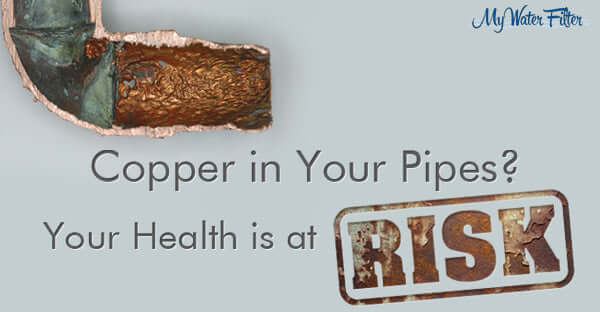When it comes to the safety of you and your loved ones, we can always learn more. When it comes to the water you are drinking, it’s vitally important you’re doing your utmost best in creating the best water you can, avoiding the risks of heavy metal contamination.
In this article, you will learn what copper is, the risks of too much copper in the body, and what you can do about it.
What Is Copper?
Copper is a metallic element that naturally occurs in the human body. There are trace amounts of it in the bloodstream and it is needed in order for organs to function, provided they are at the right levels.
Effects Of Too Much Copper In The Body
Copper in your drinking water can change the levels of copper in your body drastically. It can increase the amounts of the element in the body as well as the frequency with which it is added.
As mentioned, copper allows the body’s various systems to work properly, and this makes it important in keeping it at a healthy level. Too little copper in the body will create challenges, just as much as too much copper in your body.
Copper Toxicity
Copper Toxicity is the result of chronic or long term exposure to high levels of copper through food and water sources. When there is too much copper in the body, it can cause the following unpleasant effects, depending on the period of exposure:
Copper Toxicity Symptoms
Note: Copper poisoning symptoms can present differently for each person.
Short Term
For those who have been drinking water contaminated with copper for only a short period of time, issues with the digestive system can be identifiable symptoms.
Headaches. Gastrointestinal distress. Fever. Passing out. Feeling sick. Vomiting. Blood in your vomit. Diarrhea.Long term
For those who are exposed for too long,
Permanent damage to the liver and kidney are a higher risk.Aside from the physical effects that are likely to manifest, emotional imbalances can also occur such as:
Moodiness Depression. IrritabilityWhen the body has the perfect amount of copper, experts say that people are better equipped to regulate their emotions, while lack of copper will lead to emotional distress.
If you’re concerned about high copper and the symptoms you may be experiencing, it’s crucial you see a doctor as soon as possible as heavy metal build up in the body can be fatal over time.
Copper In Water
So how does copper get into our drinking water in the first place?
Copper pipe poisoning is more common than you think. As water makes its way to your kitchen tap, it makes contact with many pipes and in some cases, chemicals that interact with the pipes causing the plumbing to erode and release copper into the stream.
Other factors can come into play as well such as the minerals surrounding the plumbing, the flow of the water, temperature and even acidity.

Government Copper Regulation
The Government have different methods of addressing the concern of copper toxicity in water supplies. However, most follow the same protocol:
Putting down regulations on how much copper should be in the water. Steps that should be taken in order to prevent the build-up of too much copper. Informing the community of the effects and dangers of water contaminants.In Australia, the National Health and Medical Research Council (NHMRC) have included in their guideline that copper should only be 1 mg/L of water. Anything above that can be considered toxic and immediate steps are taken to bring it down to a safe level.
What You Can Do To Keep Your Water Clean
Just because there are regulations in place, this does not mean that you are safe. There are a few ways you can make sure that your drinking water is free of high levels of copper and other contaminants, and since the safety of your family is at stake, why take a risk?
Testing
First, you can have your water tested if you suspect that your water is not safe.
Certified laboratories can measure the level of copper that is present in the water that you are drinking since you are unable to detect it through normal means. This is particularly wise if there are signs that the plumbing is made of materials that are easily corroded.
Water Filter
You can take steps to prevent copper from contaminating the water that you are drinking by placing water filters in the home. A certified water filter will give you peace of mind that you will not suffer from copper toxicity, ever!
You can eliminate this problem entirely by installing a Benchtop or Under Sink Water Filter in your kitchen.
Replace piping
In extreme cases, you can replace all of the pipes and water outlets in your home with ones that will not corrode rapidly and thus deposit copper into the water supply. As you can appreciate, this would be quite costly and is a significant inconvenience to most people.

If you have any questions about the information in this article or choosing the best water filter, please feel free to contact us. We’d be delighted to help.








